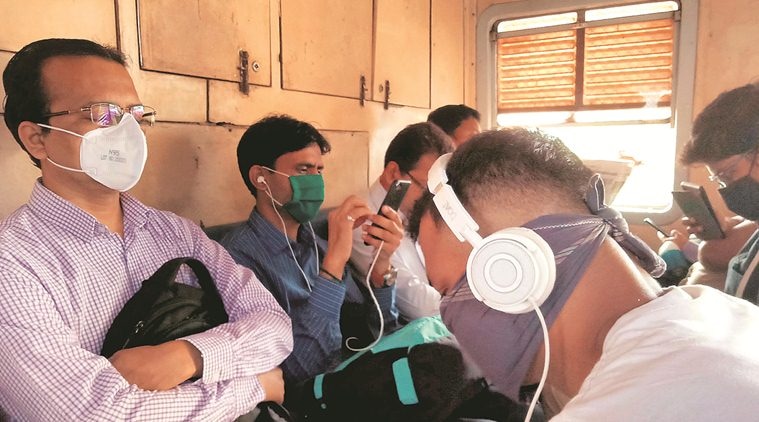 The rate offered in slums is Rs 15-18 while the original cost before the outbreak was Rs 1.5 to Rs 3.
The rate offered in slums is Rs 15-18 while the original cost before the outbreak was Rs 1.5 to Rs 3.
The global market might have slowed down, but the panic sparked by coronavirus has become a business opportunity for many in slums and villages, where face masks are being manufactured in dingy rooms, on sewing machines, and sold at a much higher rate than the standard cost. The most common is a 3-ply face mask. The rates offered in slums are Rs 15-18 while the original cost before the outbreak was Rs 1.5 to Rs 3.
According to the Association of Indian Medical Device Industry (AIMED), the country has a capacity to manufacture 20 million masks in a month by standard manufacturers. However, it has risen three-fold by rough estimates.
In Dharavi, a slum in the heart of Mumbai, a tailor has become a trader since a fortnight. He scouts for clients and directs them to another trader in Malad, in Mumbai’s suburbs. This trader sources masks for Rs 15 from a slum and sells them at Rs 16. His source is a 100 sq foot workshop in Worli Koliwada and another in Dharavi, where 65 sewing machines run for 24 hours, producing 2 lakh masks a day. Until January, this workshop manufactured Indian Premiere League T-shirts for fans.
“In January, someone asked if I can manufacture masks. We had no orders for IPL t-shirts, so I bought a roll of fabric and taught my labourers how to stitch,” the owner said. He has over 100 labourers, all slum- dwellers, who wear cotton vest, and stitch masks on non-sterile sewing machines, using no disinfectant.
The raw material used is polypropylene spunbond non- woven fabric, commonly used to manufacture masks. It looks like a normal mask but if one tears it open, a filter layer to prevent bacteria or virus remains absent. The man says he provides a certification of 99.9 per cent purity, but when The Indian Express scrutinised it, no laboratory name was mentioned.
Another trader in Dharavi said he has been selling over one lakh masks every day. “The punched masks (that are sealed) are for exports, and stitched ones are for domestic buyers,” he said. Piles of masks are kept in an unclean room he maintains. No sterile packaging is done. Another trader said he takes a deposit of Rs 25,000 and employs women to stitch masks at their homes in Malad. “We are thinking of starting stitching gowns for a coronavirus kit,” he said. In Bhiwandi, a satellite town north of Mumbai, a trader, said, “Other businesses have slowed down, so we started stitching masks. The are in huge demand.” He said several traders in Vapi, Gujarat, have also begun manufacturing masks.
Delhi-based Shekhar Dixit, export manager in SPM Medicare Pvt Ltd, said several such manufacturers have sprung up in villages bordering Delhi. To manufacture a mask, he said, the production room must be sterile, air-conditioned, and workers must be given disinfected gloves, uniform and head caps. “The purpose of a mask is to prevent infection. If we make it in an unhygienic environment, how will it protect against bacteria? We don’t allow any visitor in the production room over safety concerns,” he says. A mask ideally has a top layer of spun bond, a filter layer of melt blown fabric and inner layer again of spun bond fabric. An automated ultrasonic mask machine is used. The common fabric used is 18-20 GSM (gram per square metre), and it can reach up to 40 GSM for higher quality. The ones flooding the market have no filter layer, the fabric is 15 GSM or less, and the nose pin is unevenly placed.
Several major manufacturers certify their masks through a laboratory that tests bacterial filter efficiency, splash resistance pressure, absorbance, heavy metal ion, acidity or alkalinity, and breathing resistance. The masks made in slums either have no certification or come with a paper with no laboratory name.
“These masks will not filter any bacteria or virus. We look at them and know they are of inferior quality. But a common man will buy it and think he is protected,” said Smita Shah, managing director of Mediklin Healthcare, which manufactures protective gear. In the last few weeks, she has been approached by several local manufacturers who wish to sell their stock to her.
Masks are disposable items that are currently not regulated by either Drugs and Cosmetics Act, 1940, nor by the National List of Essential Medicines. Therefore, no regulatory body monitors it. “The government has not taken quality control measures or scrutiny of manufacturers of masks. Hopefully, from April 1, masks will be considered as drugs and come under regulation,” said Rajiv Nath, founder of AIMED. He added that China recently burnt a huge containment of masks by an Indian manufacturer after it was found inferior in quality.
The Health Ministry has stressed on avoiding masks unless the person is himself infected by coronavirus. “People need to stop panicking. A handkerchief will also protect them. There is an artificial demand created in market for masks,” said Vikas Biyani, joint commissioner (drugs), Maharashtra.
The FDA conducted a survey of one lakh masks in January and found that many manufacturers were not licensed or registered. “But we have no jurisdiction to take any action against them,” said Biyani.
Dr Anup Kumar Yadav, director of National Health Mission, Maharashtra, said they have asked district collectors and the FDA to monitor hoarding and black marketing of masks.